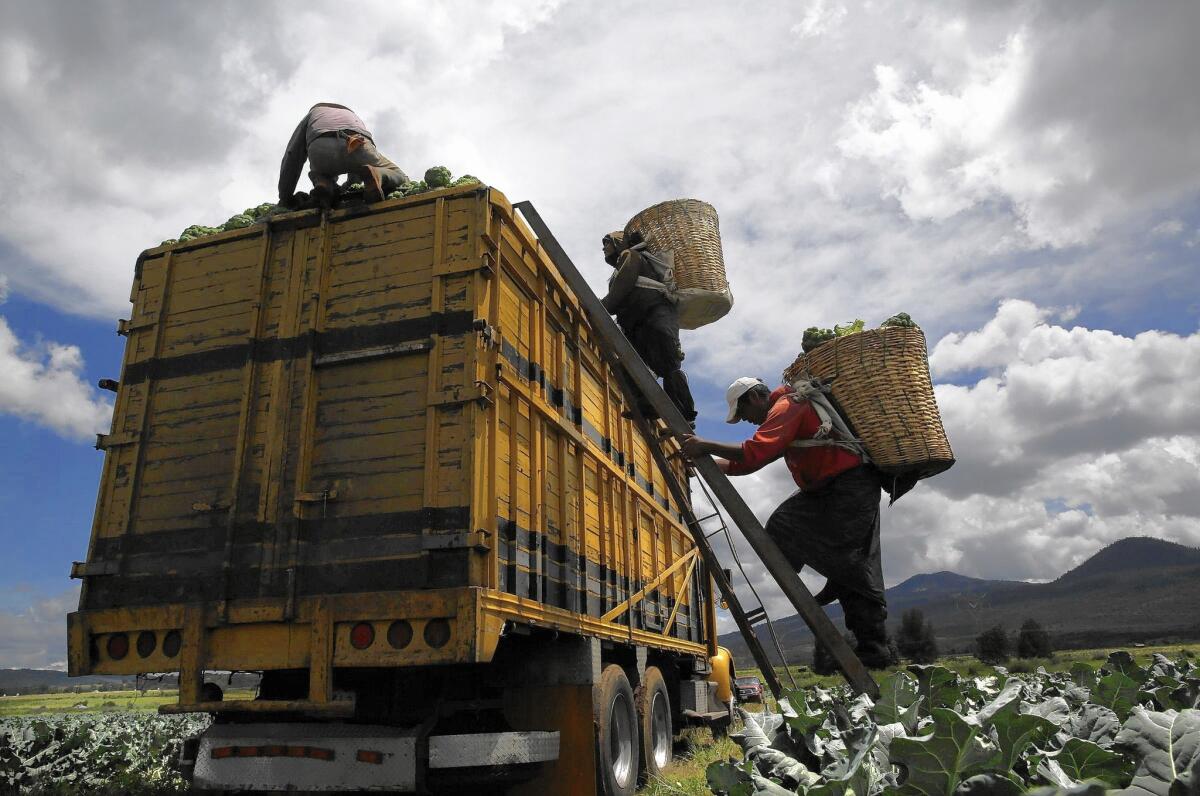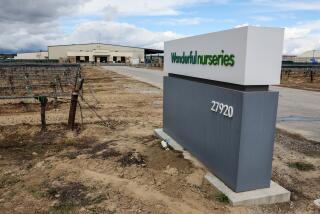Mexico and Wal-Mart launch initiative to improve lives of farmworkers

The Mexican government and Wal-Mart, the world’s largest retailer, have announced steps to improve the lives of the nation’s farmworkers, two months after a Los Angeles Times investigation detailed labor abuses at Mexican agribusinesses that supply major U.S. supermarket chains and restaurants.
Mexico’s secretary of agriculture, Enrique Martinez y Martinez, announced the creation Thursday of a “historic” alliance of produce industry groups that will focus on enforcing wage laws and improving housing, schools and healthcare for the more than 1 million laborers at export farms.
The group represents growers and distributors that handle 90% of Mexico’s produce exports to the United States, which have tripled over the last decade and now exceed $7.5 billion a year.
Separately, Wal-Mart said it is taking action to ensure that workers are treated with “respect and dignity,” reminding its in-house buyers that they should buy produce only from farms that meet the company’s standards for decent treatment of workers.
Wal-Mart also said it will ask outside suppliers to certify that they have visited “any new facility they plan to use for Wal-Mart production” and that the facilities meet company standards.
Wal-Mart said it would send a team of senior leaders to attend meetings with growers involved with the new initiative, called the International Produce Alliance to Promote a Socially Responsible Industry. Senior executives have also been assigned to examine ways to partner with other groups to improve conditions.
“This effort is aimed at leveraging the work of a broader coalition to improve the lives of workers, including making it clear that Wal-Mart’s standards do not tolerate working conditions as described in the L.A. Times,” Wal-Mart said. “We do not want to work with suppliers unless they share this commitment.”
The Times’ “Product of Mexico” series, published in December after an 18-month investigation, revealed that many farmworkers were essentially trapped in squalid labor camps, often without beds, reliable water supplies or adequate food rations. In many camps, labor bosses illegally withheld workers’ wages to prevent them from leaving until the end of the harvest season.
Martinez y Martinez called the formation of the alliance — which took place Wednesday at the Ministry of Agriculture in Mexico City — a special event for the agricultural sector and for the country, according to a summary of his remarks. Representatives of nine trade groups, including the Arizona-based Fresh Produce Assn. of the Americas, attended the event.
“We will continue making history in the sector with successful achievements like this one,” Martinez y Martinez said.
Wal-Mart lauded the high-level involvement of government officials, saying it is vital toward making progress.
“We’re optimistic and encouraged that the Mexican Ministry of Agriculture … seems to be taking a leading role in the [alliance] by working closely with producers in Mexico,” Wal-Mart said.
Industry representatives gave few details about how the alliance would meet its goals and did not commit to establishing uniform worker-welfare standards.
But the actions, together with improvements already underway and the involvement of Mexico’s Ministry of Agriculture, signal that the industry appears to be mobilizing to an extent not previously seen to improve the lives of farmworkers.
In recent weeks, industry and Mexican government officials have been preparing to open stores in labor camps to sell goods at discounted prices, breaking the hold of privately run stores known as tiendas de raya that charge inflated prices and where many workers run up huge debts.
Some of the largest export farms in Sinaloa, Mexico’s leading agricultural state, have started remodeling rundown housing, supplying beds and establishing stable water supplies. Some farms that illegally withheld wages have switched to weekly pay schedules, as required by law, state and industry officials said.
State inspectors have been carrying out more camp inspections and cracking down on operators who transport children to the fields. The series also has helped jump-start the construction of several projects, including the opening of two soup kitchens and the remodeling of a day-care center, child welfare advocates said.
Industry observers say the revelations in the series are perceived as a major public relations crisis by producers in Sinaloa and they appear to be reacting in the same way they did to past threats to their market competitiveness. Those efforts resulted in the swift eradication of child labor at large farms and the establishment of food safety measures required by U.S. buyers.
“They feel like they’re under a spotlight, and that’s why they’re acting,” said Ileana Castro, the Sinaloa state director for Save the Children.
During The Times’ investigation, laborers at half of the 30 labor camps visited by a reporter and photographer were effectively prevented from leaving because their wages were being withheld or they owed money to the camp store, or both. Barbed-wire fences and guards discouraged escape attempts.
U.S. retailers, The Times also found, did little to enforce their social responsibility guidelines calling for basic worker protections.
Wal-Mart’s involvement in any social responsibility effort is considered crucial. As the biggest buyer of produce in a country where labor law enforcement is weak to nonexistent, the retailer has enormous power to shape the lives of farmworkers. The retailer also is under pressure as rivals, most notably Whole Foods, fortify supply-chain oversight to meet consumer preferences for ethically sourced produce.
Wal-Mart’s plans are not as far-reaching as reforms the company agreed to in Florida last year, called the Fair Food Program, that raised wages for thousands of tomato pickers and established a worker grievance system and strict guidelines against forced labor.
Wal-Mart offered few details about how it will improve oversight at supplier farms. Some of the farms with abusive conditions had been inspected by third-party auditors, raising questions about the effectiveness of the oversight measures. In the past, the industry has resisted measures to bolster third-party auditing, in part because it raises costs.
“When Wal-Mart speaks, everyone listens. The question is how will they follow up on this and still have the cheapest tomatoes on the market. That’s going to be hard,” said Emily Miggins, a former sustainability manager at Safeway.
Other major retailers and restaurant chains that import Mexican produce did not comment on this week’s developments. They include Safeway, Albertsons, Kroger and Darden, which operates the Olive Garden chain.
Improvements at some of Mexico’s largest exporters were launched soon after the series was published.
At Nueva Yamal, where laborers defecated in a field because toilets were unusable, operators upgraded the latrines, and improved housing and day-care facilities, according to child-welfare and social workers. Agricola Porvenir cut ties with a rundown labor camp where people had to bathe in irrigation canals because the showers had no water.
The most sweeping changes appear to have occurred at Rene Produce, which operates six labor camps housing thousands of workers. Laborers said they no longer have to sleep on floors or bathe in irrigation canals after the operators outfitted the camps with beds and repaired bathrooms.
And the company stores that charged inflated prices have been shut down, soon to be replaced by government-run operations that will offer cheaper items, said Jose Humberto Garcia, Rene’s chief operating officer.
“We’ve never lived like we do now, thanks to” The Times’ coverage, said Fidel Tapia, a laborer at Rene, in a recent phone interview. “We hope that things keep improving.”
Twitter: @ricardin24
Read The Times’ investigation in English and Spanish: Product of Mexico
More to Read
Start your day right
Sign up for Essential California for news, features and recommendations from the L.A. Times and beyond in your inbox six days a week.
You may occasionally receive promotional content from the Los Angeles Times.







